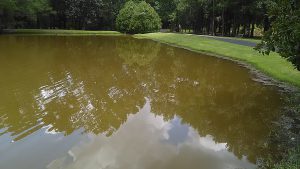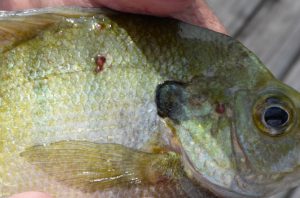Warmer weather and longer days have finally come back to Northeast Florida and this is great news for many people. But with enjoyable spring weather, comes a greater risk for private stock pond owners. A myriad of issues can plague stock pond owners due to warmer weather, poor water quality, increased aquatic weed populations, low dissolved oxygen rates, or unbalanced stocking rates. Pond owners should be aware of several management considerations that can influence the health of their fish and pond.

AERATION
Dissolved oxygen is one of the greatest factors that influences a ponds health for aquatic life. It allows fish to be able to breath oxygen through their gills and is used by other aquatic life such as bacteria and plants. The amount of dissolved oxygen will fluctuate through the day due to changes in water temperatures, variation in sunlight, fish stocking density, and amount of organic waste in the pond. If there is no natural source of aeration in your pond, continuous use of an aerator or recycling water pump may be needed to balance the dissolved oxygen levels in your pond.
FEEDING
It is perfectly acceptable to feed your fish on an occasional basis to attract them for catching purposes, or to promote quicker growth. Care should be given to limit artificial fed as greater amounts of fed can potentially increase excess fish waste and nutrients. Floating fish pellets are also recommended over sinking feeds as the pond owner can determine the amounts consumed by the fish.
CATCH and RELEASE VS. HARVEST
Many pond owners simply like the enjoyment of catching fish and releasing them back into the pond, but as time passes, mature fish can cause management problems and harvesting may be needed for the health of the pond.

FISH HEALTH
Most fish have parasites, such as protozoans, roundworms, and tape-worms, or flukes, which have almost no ill-effect on the fish. There is almost no way to removal every harmful parasite from the water, but proper management to maintain good water quality will go a long way for the health of the fish population. If an affected fish is cooked properly, most parasites will pose no health hazard for human consumption. It is always advisable to have the disease or parasite properly identified before consuming the fish, however.

WEED MANAGEMENT
Aquatic weeds can become very problematic for pond owners as they can hinder recreational use, fishing access, or even the use of pond water for irrigation purposes. While a certain amount of plant life is needed in ponds, excess weed or algae growth can have harmful effects on a pond’s water quality. Proper management and weed removal can consist of mechanically removing the weeds and leaving them on the banks to dry out and die, potentially using a dye to shade out the light to kill the weeds, or using an aquatic herbicide to control the weeds. The first step should be proper identification of the weeds, as some methods may not sure for a specific weed or algae.
If you would like to learn more about managing stocked ponds through the year, you may click on any of the following supporting links for further information or contact your local UF/IFAS County Extension Agent for specific questions or concerns.
Managing Florida Ponds for Fishing
Dissolved Oxygen for Fish Production
 0
0
